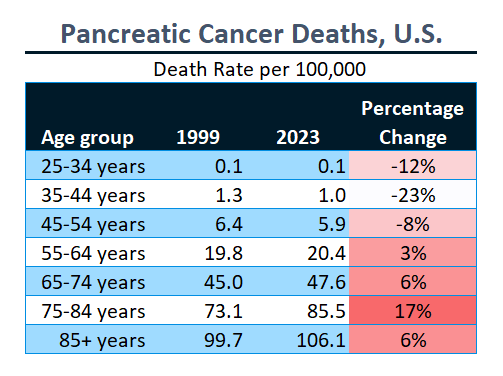Cancer Watch: Pancreatic Cancer, Young Adults, and Men's Health
Local News, Stu Update, and getting ready for Movember
In local (to me) news, CNN Anchor Announces Husband's Death In Heartbreaking Post:
Camerota, who was born in Shrewsbury, NJ said on Friday, Sept. 20 on Instagram that her husband, Tim Lewis, died on July 27, 2024 — two years after being diagnosed with Stage 4 pancreatic cancer.
Lewis' obituary on the Harding Funeral Home website says that he and Camerota live in Westport, CT.
"I cannot imagine any human being soldiering through a devastating diagnosis with more humor, humility and bravery than Tim," Camerota's post reads. "He was a phenomenal father, husband, friend and role model and the rest of us are left trying to follow in his footsteps."
Camerota's family launched a fundraiser in Lewis' memory.
Her husband had just turned 58 years old.
Being diagnosed with stage 4 cancer (as Tim Lewis was, and as my husband Stuart was back in 2017) is generally not a high-probability survival rate, but pancreatic cancer especially. There just haven’t been as many effective treatments as with many better-known cancers.
As I put together in a prior post (go there for my sources):
Stage 4 is equivalent to “distant” for stage at diagnosis. The 1-year, 3-year, and 5-year survival rates for stage 4 pancreatic cancer are low.
Pancreatic death rates have primarily been growing at older ages in the U.S., over the long term.
This is something to note, as the next bit concerns young adults and cancer.
More on Young Adults and Cancer
I was at Memorial Sloan Kettering in White Plains (ok, “West Harrison”) with my husband Stuart for the last time in a few weeks (I hope) and I picked up a bunch of literature while there, as I noted they had a bunch of material very pertinent to STUMP.
This article caught my eye: The Latest Research on Why So Many Young Adults Are Getting Cancer
Men and women in the prime of their lives are increasingly being diagnosed with serious cancers, including colorectal, breast, prostate, uterine, stomach (gastric), pancreatic, and more. One forecast predicts cancer for this age group will increase by 30% globally from 2019 to 2030.
I tend to focus more on death rates as that data is easiest to come by. People die only once, after all.
There is also an issue with regards to cancer diagnosis: are cancers being diagnosed because younger people being more often screened for cancer?
In general, younger people have had lower death rates due to cancer:
But specific causes of cancer have had bad trends:
Back to the MSK article:
An obvious focus for rising cancer rates is the vicious circle of obesity, highly processed foods, and sedentary lifestyles, which are an epidemic in America and growing in many countries.
“We know obesity causes inflammation, which can lead to cancer,” explains Dr. Goldfarb. “We believe that plays a role and needs to be addressed. But it doesn’t fully explain the growing rates of young women with breast cancer.”
Nor does it explain the increase in cases seen by MSK’s Center for Young Onset Colorectal and Gastrointestinal Cancer, which is co-directed by gastroenterologist Robin Mendelsohn, MD. The center has tracked more than 4,000 younger adults. “They are actually less likely to be obese than the general population,” says Dr. Mendelsohn. “They are also less likely to use tobacco or have other known risk factors.”
….
In May, Dr. Mendelsohn presented preliminary data at a medical conference about the microbiome of people with early-onset colorectal cancer. The microbiome, also known as the invisible organ, is the enormous community of bacteria and other microbes that live in our gut, which help regulate our digestive system.
“We found that younger people with colorectal cancer had less diversity in their microbiome than older patients,” says Dr. Mendelsohn. “And the makeup of the two groups’ microbiome is different too.” That’s important because more diversity generally means better health.
There is some other stuff there as well.
One thing I’m noticing, though many people are looking at supposedly a jump in the pandemic, is that most of the recent cancer increases (in mortality) have long-term slow increases.
Movember and Stuart
I got my Movember start-up email the day of Stuart’s (most recent “last”) radiation therapy. So I re-activated the Mo-space for 2024. It’s there, but I won’t be actively fundraising yet.
For those who are new to STUMP (that’s Stu (my husband) + MP (that’s me, Mary Pat)), Stuart was diagnosed with advanced prostate cancer in August 2017. It’s not “curable”, but it’s treatable.
I’ve been doing the Movember fundraiser since November 2017. The Movember Foundation focuses on men’s health issues, but particularly prostate cancer, testicular cancer, and men’s mental health and suicide prevention.
Prostate cancer mortality trends have been bad in the U.S. for a variety of reasons.
More to come in November/Movember.
Related posts
20 Jul 2024: RIP, Rep. Sheila Jackson Lee: An Update on Pancreatic Cancer Death Trends
6 Jun 2024: Pancreatic Cancer Trends: 1999-2023, U.S.
16 Feb 2024: Cancer Death Rates by Race/Ethnicity, U.S. 1968-2023
8 Feb 2024: Top Cancer Types: By Crude Death Rate, 1968-2023
23 Mar 2024: The Princess Announces Cancer Diagnosis
2 Apr 2024: Cancer Trends among Young Adults: An Issue of Rates and Types









